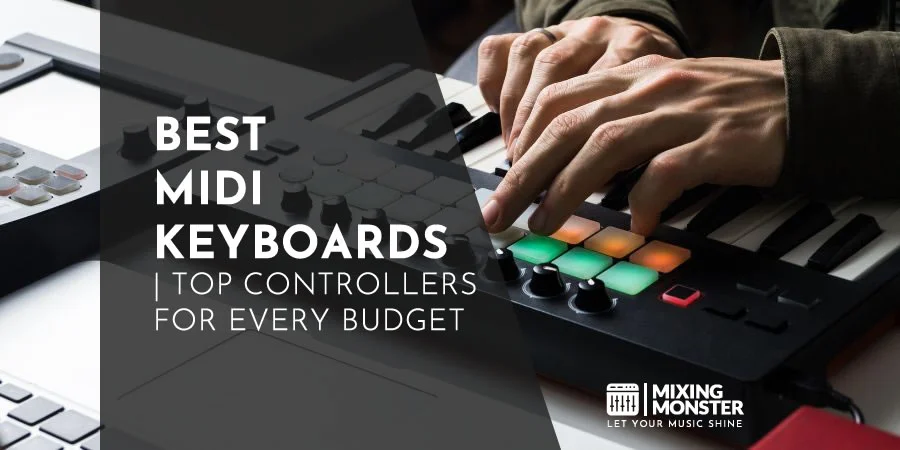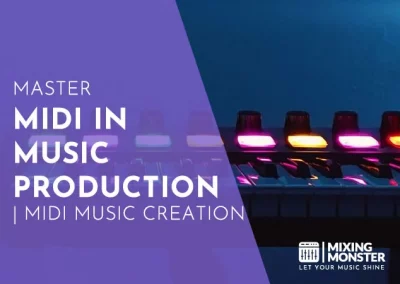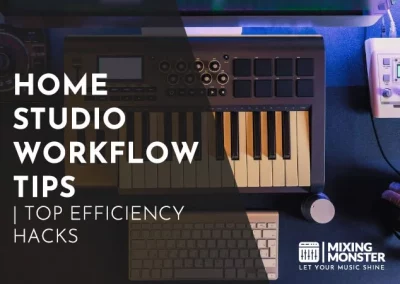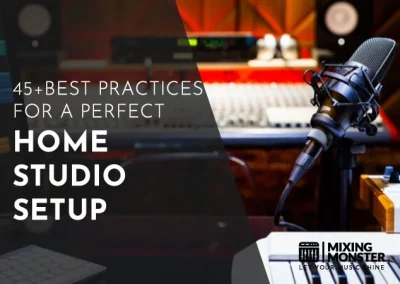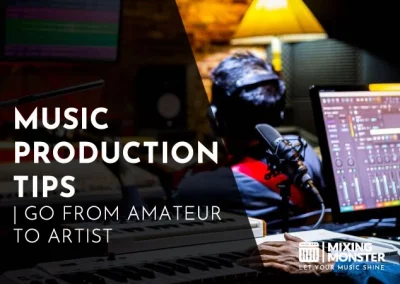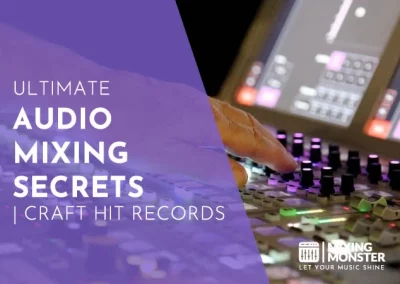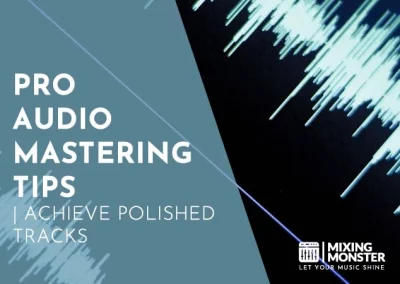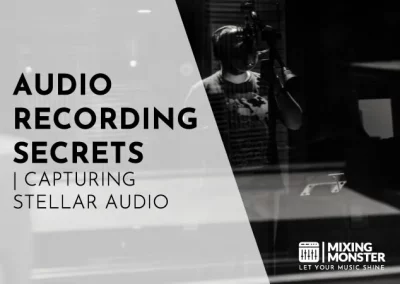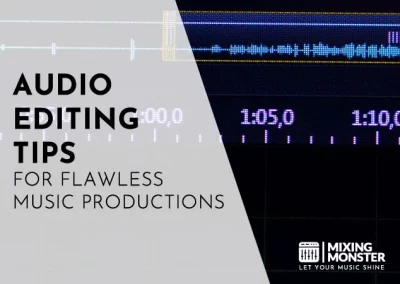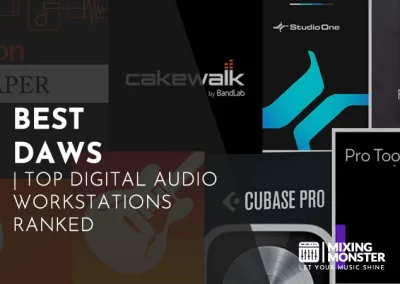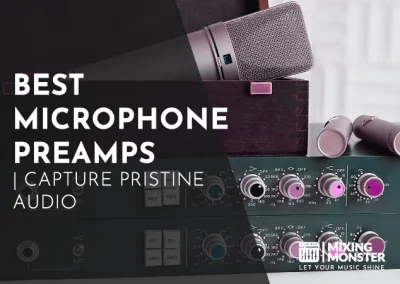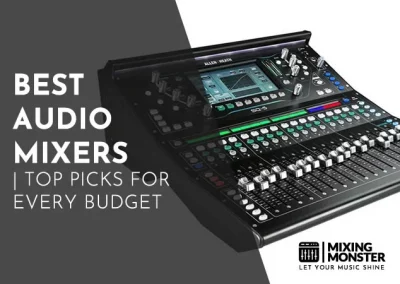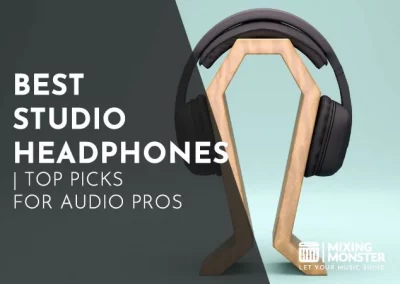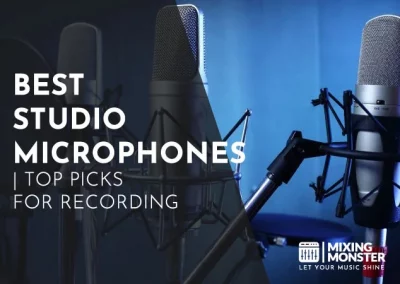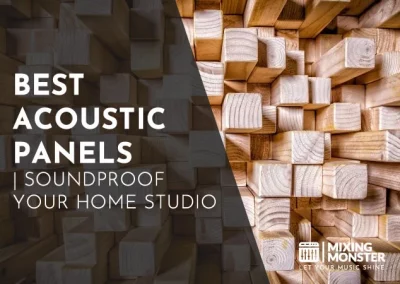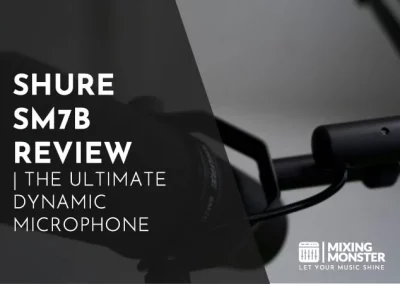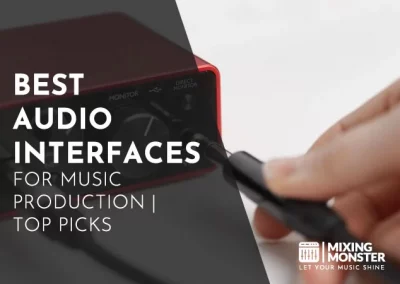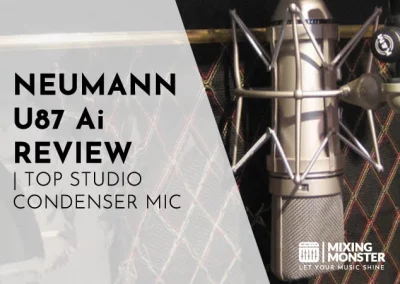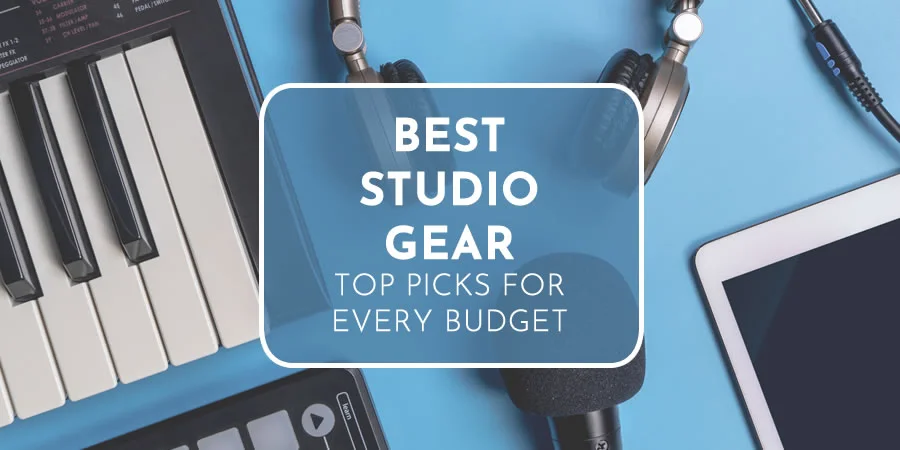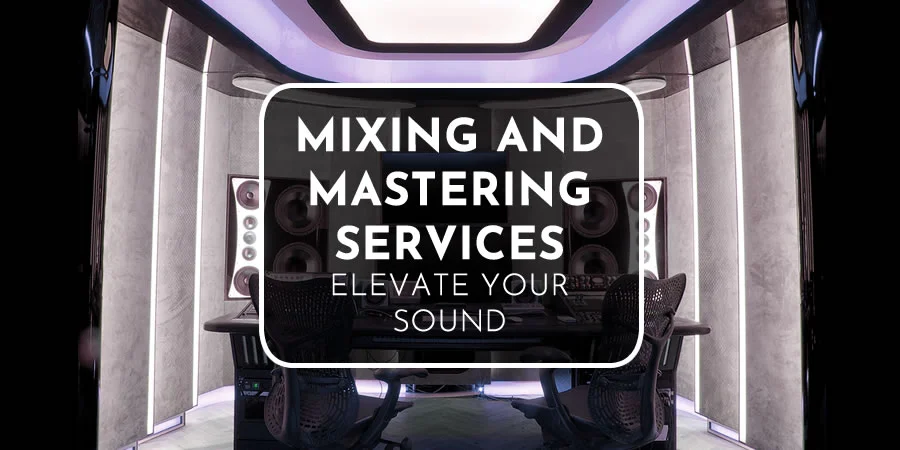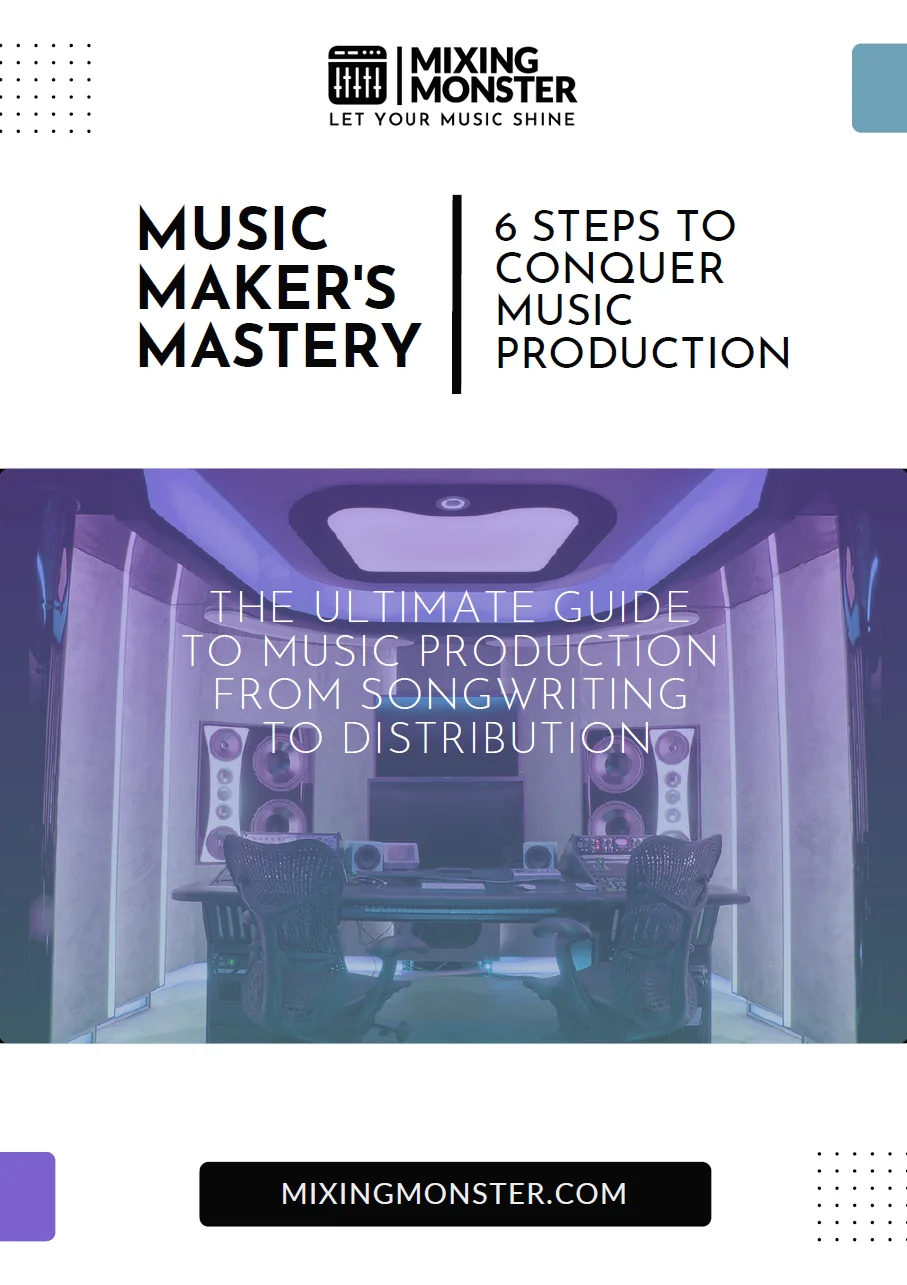Home > Blog > Studio Gear > Recording Gear
Disclosure: Some of the links below are affiliate links, meaning that at no additional cost to you, we will receive a commission if you click through and make a purchase. Read our full affiliate disclosure here.
MIDI keyboards are integral tools for musicians, producers, and hobbyists, offering the crucial tactile interface needed for composing digital music. They bridge musical ideas and the vast array of virtual instruments in today’s digital audio workstations. Selecting the right MIDI keyboard can elevate your music production to new heights, providing an expressive and intuitive way to create melodies, harmonies, and beats.
MIDI keyboards, or Musical Instrument Digital Interface keyboards, allow for transmitting musical performance information between electronic devices. They don’t generate sound independently but control software instruments or hardware synthesizers. These keyboards come in various sizes, from portable 25-key models to full 88-key instruments, mirroring a traditional piano. Features such as weighted keys, touch sensitivity, aftertouch, and integration capabilities significantly affect the playability and responsiveness of the device. MIDI keyboards also often include additional control options like pads, knobs, and faders to manipulate music in real time.
When we’re in the market for a new MIDI keyboard, we consider the number of keys and critical action types, including performance controls, compatibility with our software, and its connectivity options. Moreover, build quality, portability, and price range are important considerations, especially when balancing budget constraints against professional needs. Our collective experience has shown that it’s not just about having many features but finding a harmonious balance that matches our workflow and enhances our creative process.
Thus, we’ve dedicated time to evaluating a variety of MIDI keyboards to guide you in finding the one that best fits your artistic demands and budget. Whether performing live, composing in a studio, or just beginning your musical journey, a well-chosen MIDI keyboard can be a pivotal component of your musical arsenal.
KEYNOTES:
- In this article, you’ll find a comprehensive list of the best MIDI Keyboards on the market.
- MIDI keyboards are categorized into 3 sections:
Best Budget MIDI Keyboards
Best Midrange MIDI Keyboards
Best High-End MIDI Keyboards - Each section contains:
3 MIDI Keyboards
ordered by price (low > high)
Our Top Picks – Best MIDI Keyboards
Table Of Contents
1. What Are The Best MIDI Keyboards?
Best Budget MIDI Keyboards
Best Midrange MIDI Keyboards
Best High-End MIDI Keyboards
2. What Is A MIDI Keyboard?
3. MIDI Keyboard Buying Guide
4. Finding Your Perfect MIDI Keyboard: Key Takeaways
5. FAQ

1. What Are The Best MIDI Keyboards?
In our quest to find the ideal MIDI keyboard for every type of musician, we’ve researched and tested to bring you a carefully curated selection of instruments. Whether you’re a beginner looking for your first keyboard or a seasoned pro needing advanced features, our roundup covers a range of models that deliver quality, functionality, and value.
Here Are Our Picks For The Best MIDI Keyboards:
Best Budget MIDI Keyboards
2. M-Audio Oxygen 25 MKV
Best For Compact Studio Setups
Best Midrange MIDI Keyboards
5. Native Instruments Komplete Kontrol A49
Best Software Integrated MIDI Keyboard
Best High-End MIDI Keyboards
8. Novation 61SL MKIII
Best Integrative MIDI Keyboard
Best Budget MIDI Keyboards
#1 Novation Launchkey Mini MK3
Best For Mobile Music Producers And Beginners
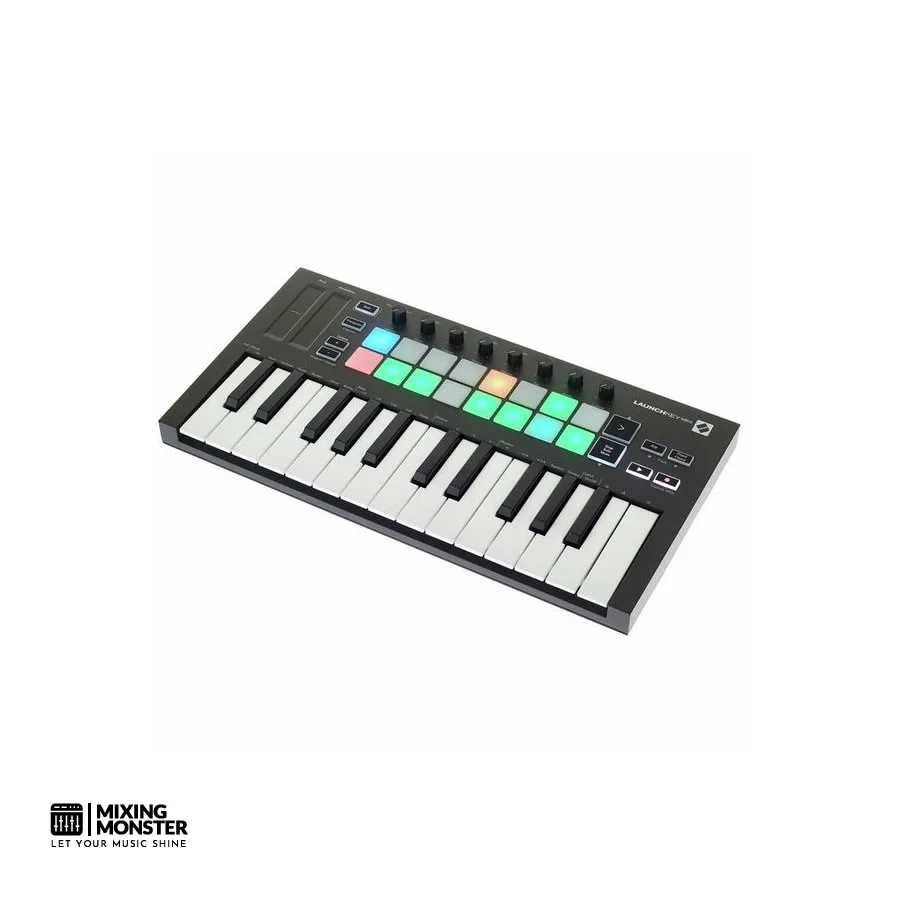
Overview:
The Novation Launchkey Mini MK3 MIDI Keyboard is the latest compact and portable MIDI controller from Novation, explicitly designed for producers and musicians on the go. This little powerhouse packs a punch with its 25 mini keys, 16 RGB pads, and an in-built arpeggiator, making it an ideal choice for crafting melodies, beats, and song arrangements in any setting.
With seamless integration with Ableton Live and other major DAWs, the Launchkey Mini MK3 is perfect for beginners looking to start their music production journey or experienced producers seeking a mobile solution.
Pros:
- Portable and lightweight design, perfect for traveling musicians
- Seamless integration with Ableton Live and other DAWs
- 16 backlit RGB drum pads for dynamic beat-making
- Intuitive arpeggiator with easy-to-use controls
- USB-powered, no need for an external power supply
Cons:
- Mini keys may not be suitable for players used to full-sized keys
- Limited onboard controls for mixing and tweaking sounds
- It may require additional mapping for full functionality with non-Ableton DAWs
- The small form factor might be challenging for those with larger hands
- No MIDI out port for external hardware connection
Unique Selling Point:
The unique selling point of the Novation Launchkey Mini MK3 MIDI Keyboard lies in its deep and intuitive Ableton Live control. This controller is precisely engineered to streamline workflow and inspire creativity with its one-touch access to Ableton’s Capture MIDI function, device macros, and clip and scene launching.
Key Benefits:
- The compact design makes it effortless to set up and create music anywhere, serving mobile producers and performers.
- The RGB pads offer expressive drumming and clip-launching capabilities, enhancing user performance and production.
- The built-in arpeggiator with fixed chord mode allows for the instant creation of complex melodies and harmonies, serving songwriters and composers.
Pricing:
| Average Price | ~ $95 |
Review:
The Novation Launchkey Mini MK3 MIDI Keyboard is a remarkable tool for any music producer or performer looking to bring their ideas to life with minimal setup and maximum portability. From the moment you plug it into your laptop or computer, you’ll appreciate the intuitive layout and the ease with which you can navigate your DAW of choice.
The integration with Ableton Live is particularly impressive, offering a level of control that feels like an extension of the software. The 16 RGB pads are responsive and satisfying, whether you’re drumming out a beat or launching clips in a live performance setting.
Despite its compact size, the Launchkey Mini MK3 doesn’t compromise on functionality. The keys, while mini, are velocity-sensitive, allowing for expressive playing. The pitch and modulation strips provide additional performance options, and the device’s knobs offer real-time control over your software instruments and effects. The arpeggiator is a boon for creativity, with modes and rhythms that can spark new ideas or add complexity to your tracks.
One of the few drawbacks is the absence of a MIDI out port, which limits the ability to directly control external hardware synths or drum machines. However, many will be willing to make this trade-off for a controller that sits comfortably in your backpack.
Regarding build quality, the Launchkey Mini MK3 feels sturdy and well-constructed, ready to withstand the rigors of travel. The pads and buttons are tactile and durable, reassuring users that this MIDI keyboard can handle frequent use.
In conclusion, the Novation Launchkey Mini MK3 MIDI Keyboard is an excellent choice for producers and performers who value portability, seamless software integration, and a wide range of features that encourage musical exploration. Whether you are just starting or a seasoned musician looking for a compact MIDI controller, the Launchkey Mini MK3 is a versatile and inspiring tool that holds its own in the competitive world of music production equipment.
#2 M-Audio Oxygen 25 MKV
Best For Entry-Level Musicians And Compact Studio Setups
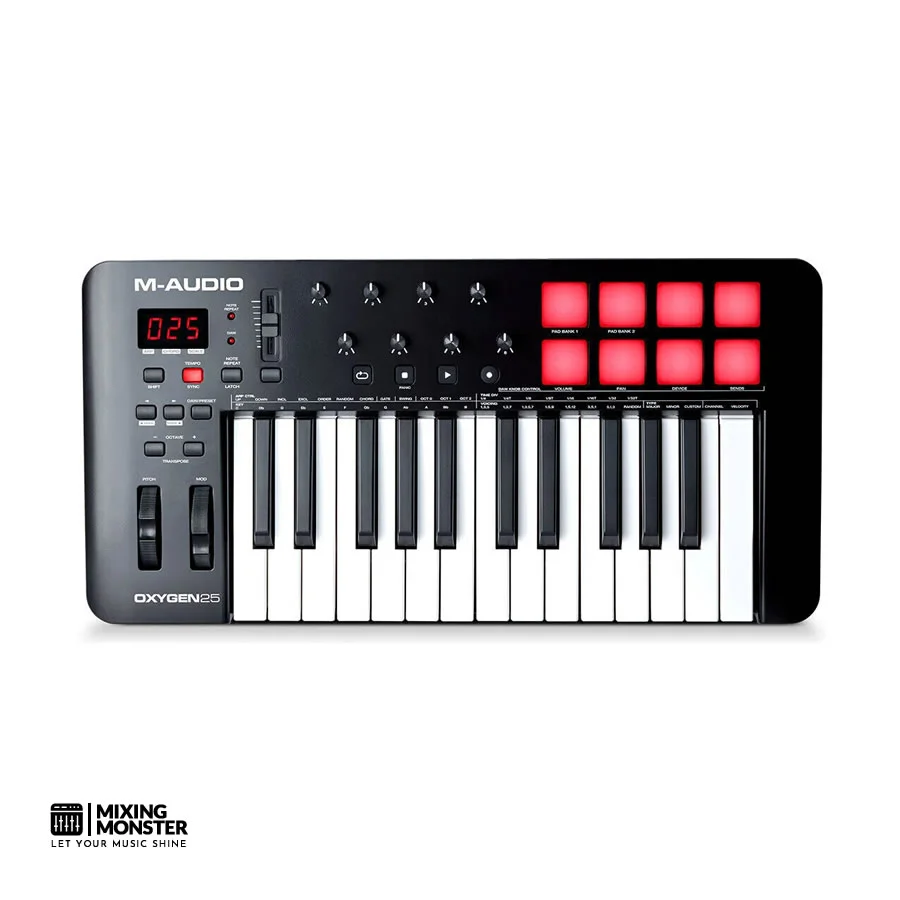
Overview:
The M-Audio Oxygen 25 MKV MIDI Keyboard is a compact and versatile instrument perfect for those diving into music production or with limited space.
This 25-key USB MIDI keyboard is lightweight and portable, making it an excellent choice for on-the-go producers. It comes with velocity-sensitive keys and a series of controls, including eight assignable knobs, making it a perfect tool for real-time tweaking and performance.
Pros:
- Compact and portable, ideal for small studios or mobile setups
- Velocity-sensitive keys allow for expressive performances
- Eight assignable knobs for hands-on control over your DAW and virtual instruments
- Includes a comprehensive software suite for immediate music creation
- Easy plug-and-play setup for both Mac and PC
Cons:
- Limited to 25 keys, which may not be sufficient for complex compositions
- Some users may prefer weighted keys for a more realistic piano feel
- There is no aftertouch feature, which can be a drawback for more advanced players
- The small size might be less suitable for players with larger hands
- The included software may have a learning curve for beginners
Unique Selling Point:
The unique selling point of the M-Audio Oxygen 25 MKV MIDI Keyboard is its perfect balance of functionality and portability. Despite its tiny footprint, it doesn’t compromise on the essentials that make MIDI keyboards a vital tool for modern music production.
Key Benefits:
- The compact design makes it easy to fit into any studio space or carry to live performances.
- The array of assignable knobs and velocity-sensitive keys provide extensive control, enhancing musical expression.
- A generous bundle of included software offers everything needed to start producing music right out of the box.
Pricing:
| Average Price | ~ $110 |
Review:
The M-Audio Oxygen 25 MKV MIDI Keyboard is an excellent choice for those entering the world of music production or needing a compact solution for their setup. From the moment you unbox this keyboard, its build quality and thoughtful design are evident. The keys respond well to touch, and the knobs offer precise control over your music software, allowing for a dynamic and interactive creative process.
The software suite with the keyboard is a treasure trove for beginners, providing a range of tools to start making music immediately. While the keyboard’s 25 keys may be limiting for some, they are more than sufficient for learning, creating basic melodies, and working with loops and samples. Its portability is a huge plus, making it easy to move from studio to stage or to collaborate with other musicians without hassle.
One potential downside is the lack of weighted keys, which could be a dealbreaker for those accustomed to the feel of a traditional piano. However, this is rarely an issue for electronic music producers and those who use MIDI primarily for beats and synth lines. Additionally, the absence of aftertouch might disappoint seasoned players looking for that extra level of expression.
Despite these minor cons, the M-Audio Oxygen 25 MKV MIDI Keyboard is a powerful tool for music creation. Its ease of use, combined with the included software, ensures that even those new to music production can jump in without feeling overwhelmed. For its price point, it offers an impressive array of features that will serve both novice and experienced producers well.
In conclusion, the M-Audio Oxygen 25 MKV MIDI Keyboard is a wise investment for anyone looking for a MIDI controller that balances functionality, portability, and affordability. Whether producing in a home studio, performing live, or making music on the go, this keyboard is equipped to handle your creative needs. Its thoughtful design and robust software package make it a standout choice that seamlessly fits into any musician’s toolkit.
#3 Akai MPK mini MK3
Best Entry-Level MIDI Keyboard For Musicians
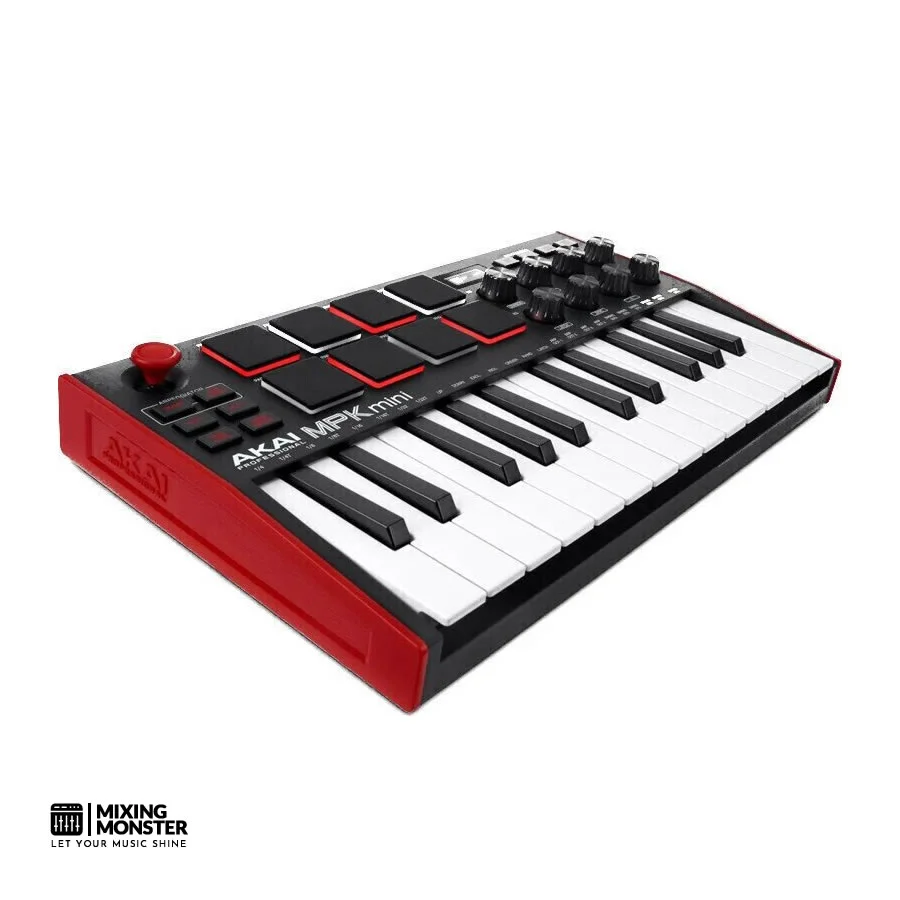
Overview:
The Akai MPK mini MK3 is the latest iteration of the popular compact MIDI keyboard controller from the well-established music equipment brand Akai Professional. This product is designed to cater to the needs of musicians who require a portable solution without sacrificing functionality.
The MPK mini MK3 comes with 25 synth-action mini keys, 8 backlit, velocity-sensitive drum pads, and an array of assignable knobs, providing ample control for a variety of music production software.
Pros:
- Compact and portable, perfect for on-the-go music production
- Integrates with most DAWs seamlessly
- It comes with a comprehensive software package
- Velocity-sensitive keys and pads for expressive performances
- Built-in OLED display for immediate feedback
Cons:
- Mini keys might not suit players used to full-size pianos
- Limited controls compared to larger MIDI controllers
- Some users may prefer more than 25 keys
- Drum pads may be small for those with larger fingers
- USB-powered, which can be limiting without a power bank or laptop
Unique Selling Point:
The unique selling point of the Akai MPK mini MK3 is its blend of portability and comprehensive control. Despite its small size, it includes full-sized controller features like the 8 MPC-style drum pads and assignable knobs, making it an ideal choice for producers who need to create music anywhere.
Key Benefits:
- The compact design makes it easy to transport and set up in any environment, from hotel rooms to coffee shops.
- Including a full software production suite means users can start creating music right out of the box.
- Its plug-and-play compatibility with most digital audio workstations ensures a smooth workflow for producers of all skill levels.
Pricing:
| Average Price | ~ $110 |
Review:
The Akai MPK mini MK3 is a powerful tool for any musician looking for a compact MIDI controller that doesn’t skimp on features. The build quality and thoughtful design are apparent when you unbox the MPK mini MK3.
Including the Gen 2 enhanced dynamic keybed offers a responsive and satisfying playing experience for a mini keyboard. The 8 MPC drum pads are a joy to use, with a tactile feel that makes beat production and launching clips a breeze.
The assignable knobs provide real-time control over effects and instruments, which is essential for dynamic live performances and in-studio tweaks. The onboard OLED screen is a small but significant addition, providing clear feedback on the current parameters and settings, which helps to keep your focus on the music rather than the computer screen.
The software bundle with the Akai MPK mini MK3 is not overlooked. It includes titles like MPC Beats, AIR Hybrid, Mini Grand, and Velvet, which offer a range of sounds and functionalities that can cater to virtually any music genre. This makes it an excellent value for beginners who may still need to invest in a lot of software or for seasoned producers looking to expand their sonic palette.
However, the MPK mini MK3 has its limitations. While velocity-sensitive, the mini keys may not be the best fit for those accustomed to the feel of a traditional piano. Additionally, while the portability is a huge plus, some may find the 25-key range limiting for more complex compositions that require a broader range of notes.
In conclusion, the Akai MPK mini MK3 strikes a remarkable balance between portability and functionality. It’s a top choice for mobile producers and home studio enthusiasts alike. Whether you’re laying down beats, composing melodies, or tweaking parameters, the MPK mini MK3 is a versatile and capable MIDI controller.
As you pack it up and take it with you, or as it sits neatly on your desk, it’s clear that the MPK mini MK3 is a little powerhouse that can easily handle various music production tasks.
Best Midrange MIDI Keyboards
#4 Arturia KeyLab Essential 49 MK3
Best Streamlined MIDI Keyboard For Live Performers
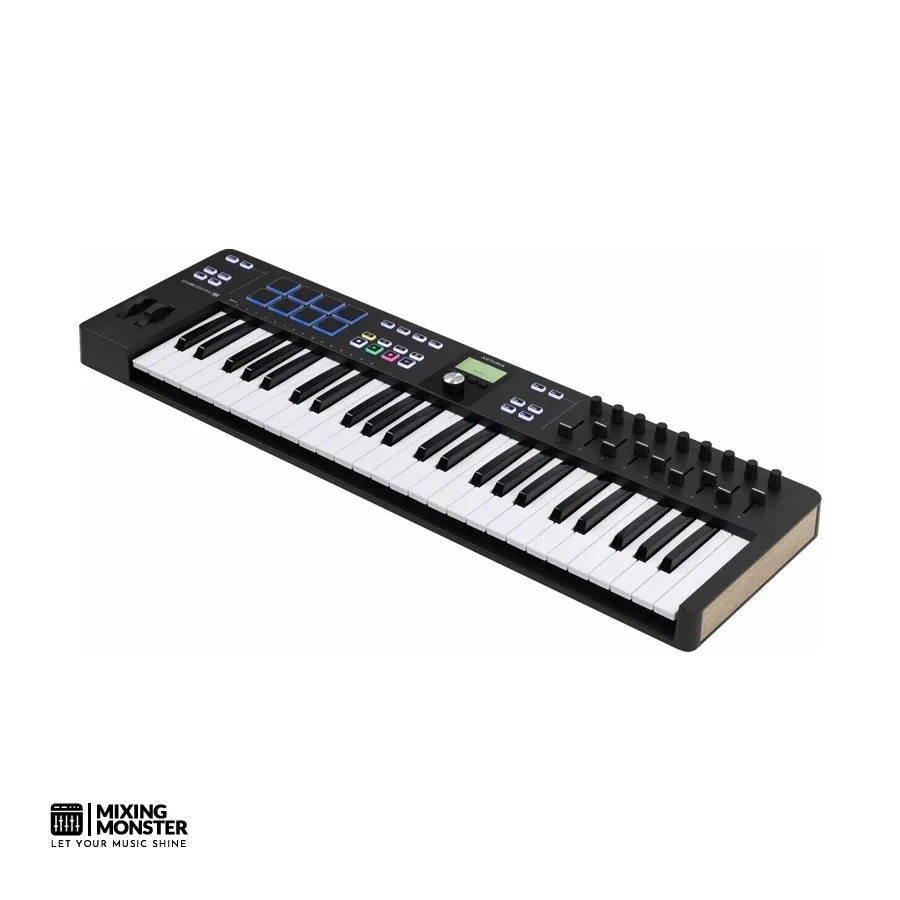
Overview:
The Arturia KeyLab Essential 49 mk3 MIDI Keyboard is a streamlined interface designed for the modern music creator. It offers a seamless blend of functionality and intuitive design, making it an ideal choice for studio recording and live performance.
The keyboard provides a hands-on approach to virtual instruments and DAW control, with its 49 responsive keys and comprehensive control surface.
Pros:
- 49 velocity-sensitive keys for expressive playing
- Includes a suite of software instruments and DAW integrations
- User-friendly interface with clearly labeled controls
- Compact design, perfect for small studio spaces or gigging
- Durable build quality suited for frequent use
Cons:
- Limited to 49 keys, which may not suffice for players used to a full 88-key range
- Some advanced producers may desire more knobs and faders for intricate control
- It may require additional mapping for specific software not pre-configured
- No aftertouch feature on keys
- Power adapter sold separately
Unique Selling Point:
The unique selling point of the Arturia KeyLab Essential 49 mk3 MIDI Keyboard is its perfect balance between functionality and ease of use. It is designed to streamline the creative process, allowing musicians to focus on their performance without being bogged down by complicated setups.
Key Benefits:
- The intuitive layout and pre-mapped controls offer a plug-and-play experience, reducing setup time and learning curves.
- With its inclusion of Analog Lab software, users gain access to thousands of synth sounds and presets right out of the box.
- The compact and lightweight design of the KeyLab Essential 49 mk3 makes it an excellent choice for musicians on the move without sacrificing playability.
Pricing:
| Average Price | ~ $210 |
Review:
The Arturia KeyLab Essential 49 mk3 MIDI Keyboard stands out as a top-tier controller for newcomers and seasoned musicians. When you lay your hands on the responsive keys, you’ll appreciate the instrument’s dedication to streamlining music production and performance. The integration with Arturia’s Analog Lab software opens up a world of sonic possibilities, allowing users to explore an extensive library of sounds.
The keyboard’s layout is thoughtfully designed, with each control strategically placed for ergonomic use. The pitch and modulation wheels and the DAW command center are easily accessible, enhancing the overall workflow. The RGB backlit pads add a visual flair and provide additional control for percussion or launching clips, which is particularly handy during live sets.
Despite its compact size, the KeyLab Essential 49 mk3 doesn’t feel cramped. The keys are full-sized and velocity-sensitive, offering a satisfying tactile experience. Including chord and scale functions is a boon for composers and performers alike, aiding in creating complex harmonies and ensuring that every performance is in key.
While the lack of aftertouch and a full 88-key range may deter some advanced players, the KeyLab Essential 49 mk3 is not intended to be an all-encompassing solution. Instead, it’s a competent MIDI controller prioritizing ease of use, portability, and immediate sound access. For those who require more controls, Arturia offers other models in the KeyLab series that may cater to those needs.
In terms of value, the Arturia KeyLab Essential 49 mk3 MIDI Keyboard punches above its weight class. The build quality is solid, and the keyboard feels like it can withstand the rigors of regular use. The software bundle alone is worth the price of admission, offering a comprehensive package for those looking to dive into music production or expand their sonic palette.
To conclude, the Arturia KeyLab Essential 49 mk3 MIDI Keyboard is a well-rounded MIDI controller that embodies the essential needs of today’s musicians. It’s a smart choice for anyone looking to combine a tactile keyboard experience with the versatility of software instruments, all packaged in a sleek, user-friendly design.
Whether crafting your next hit in the studio or performing live on stage, the KeyLab Essential 49 mk3 is a reliable partner that won’t disappoint you.
#5 Native Instruments Komplete Kontrol A49
Best Software Integrated MIDI Keyboard
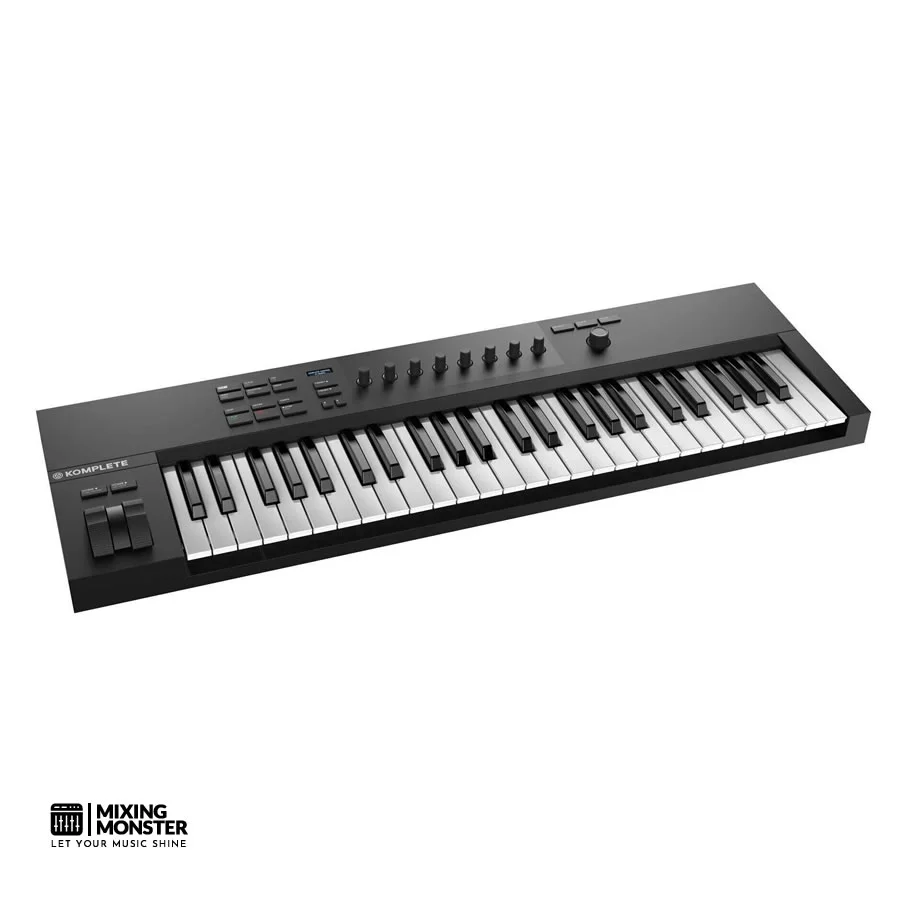
Overview:
The Native Instruments Komplete Kontrol A49 MIDI Keyboard is a versatile and user-friendly MIDI controller designed for musicians and producers seeking a seamless creative experience.
With its intuitive interface and deep integration with Native Instruments’ software, this keyboard streamlines workflow and sparks creativity. The A49 model offers a balanced combination of playability and portability, making it an excellent choice for studio and live settings.
Pros:
- Semi-weighted keys provide an expressive and natural playing experience.
- Comprehensive control over virtual instruments and DAWs through the Komplete Kontrol software.
- Smart Play features enable easy creative composition, including scale mapping and chord sets.
- The compact design makes it suitable for small studio spaces and on-the-go production.
- It comes with a collection of premium software, enhancing its value.
Cons:
- Limited to USB connectivity, which may not suit all studio setups.
- Some users may require more than 49 keys for complex compositions.
- It does not include aftertouch, which might be a limitation for advanced players.
- The integration is most seamless with Native Instruments software, potentially limiting for those using other programs.
- There is no built-in MIDI interface for connecting external hardware directly.
Unique Selling Point:
The unique selling point of the Native Instruments Komplete Kontrol A49 MIDI Keyboard is its deep integration with the Komplete Kontrol ecosystem. This integration allows users to browse and preview sounds across the entire Komplete and NKS libraries directly from the keyboard, streamlining the creative process significantly.
Key Benefits:
- The semi-weighted keybed offers a responsive and satisfying playing experience, catering to beginners and experienced players.
- Smart Play technology enables even those with limited knowledge of music theory to compose impressive music with advanced chord and scale functions.
- Including a comprehensive software bundle with the keyboard provides immediate access to high-quality sounds and tools for music production.
Pricing:
| Average Price | ~ $225 |
Review:
The Native Instruments Komplete Kontrol A49 MIDI Keyboard stands out in the crowded MIDI controller market with its user-friendly design and powerful software integration. Right out of the box, the A49 impresses with its sleek, no-nonsense layout and the quality of its semi-weighted keys, which feel great under the fingers and respond well to nuanced playing.
The keyboard’s integration with the Komplete Kontrol software is a game-changer, providing immediate access to a vast array of sounds and enabling producers to tweak parameters on the fly without reaching for the mouse. The Smart Play features are a boon for creativity, allowing users to experiment with melodies and harmonies in new and exciting ways.
While the A49 is a robust music production tool, it has some limitations. The absence of aftertouch may disappoint performers looking for that extra level of expression, and those with more extensive hardware setups might miss having traditional MIDI ports. However, for most home studio users and on-the-go producers, these are minor drawbacks compared to the overall functionality and quality of the keyboard.
Another strong point is the included software bundle, which provides the Komplete Kontrol software and a selection of instruments and effects from Native Instruments’ acclaimed Komplete library. This adds significant value to the A49, especially for those just starting their production journey who might still need to get a large collection of virtual instruments.
In conclusion, the Native Instruments Komplete Kontrol A49 MIDI Keyboard is a fantastic option for those looking for a MIDI controller that offers a great playing experience, deep software integration, and creative assistance through its Smart Play features.
Whether used in a home studio or for live performances, the A49 is a reliable and inspiring tool for music creation. Its strengths far outweigh its limitations, making it a worthy investment for budding and seasoned producers.
#6 Novation Launchkey 88 MK3
Best Entry-Level Full-Sized MIDI Keyboard
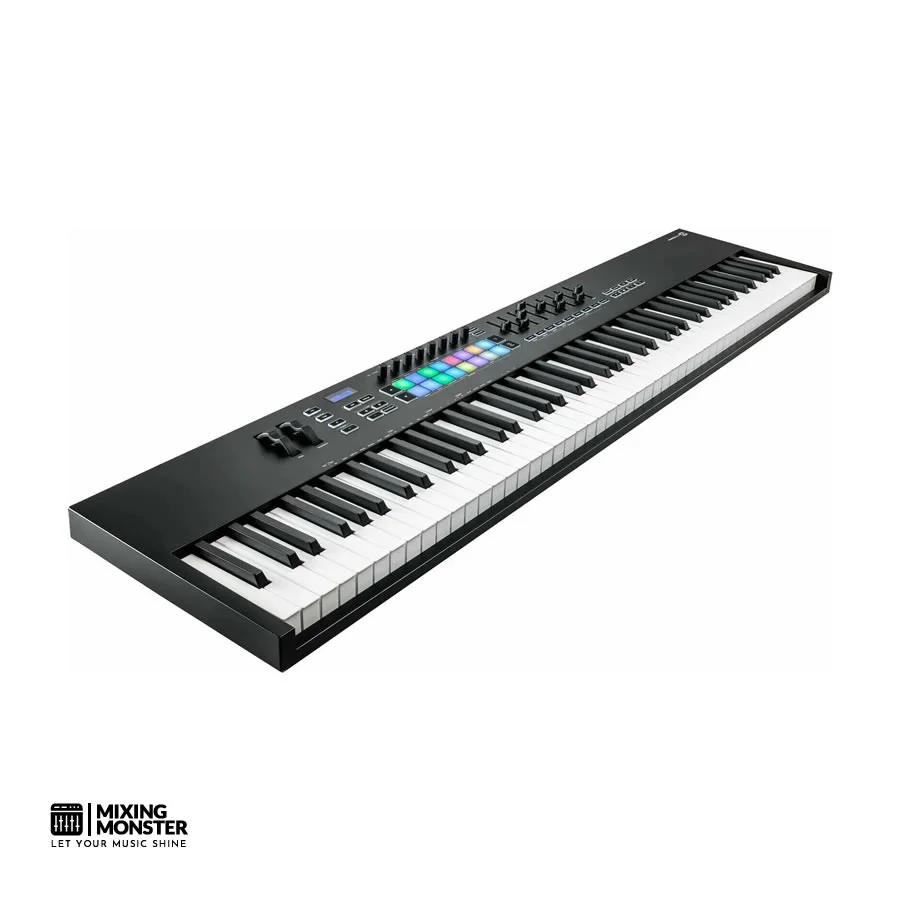
Overview:
The Novation Launchkey 88 MK3 MIDI Keyboard is a state-of-the-art instrument designed for serious musicians who demand a wide range of controls and features at their fingertips.
This model stands out with its full-sized, semi-weighted keys, providing a natural and responsive playing experience. Its integration with Ableton Live and other major DAWs makes it a powerful tool for studio recording and live performance, offering intuitive control over all aspects of music production.
Pros:
- Full-sized, 88-note semi-weighted keybed with aftertouch for expressive playing
- Seamless integration with Ableton Live and compatibility with other DAWs
- Comprehensive control options including 16 RGB pads, 9 faders, and 9 rotary knobs
- Scale and Chord Modes, along with a powerful arpeggiator, enhance creativity
- USB-C connectivity for fast and efficient use with modern devices
Cons:
- It may be too large for small studio spaces or portable setups
- The price point might be high for beginners or hobbyists
- Some users may require time to utilize the deep integration features fully
- It might be overwhelming for those new to MIDI controllers or music production
- Not all DAWs may support the auto-mapping features as seamlessly as Ableton Live
Unique Selling Point:
The unique selling point of the Novation Launchkey 88 MK3 MIDI Keyboard is its impressive 88-note semi-weighted keybed with aftertouch, a feature that is not commonly found in MIDI controllers, especially those that are designed with portability in mind. This makes it an ideal choice for professional musicians who require a full range of piano keys and expressive control for their performances and compositions.
Key Benefits:
- The semi-weighted keys offer a realistic piano feel, enhancing performance and recording precision.
- The controller’s deep integration with Ableton Live streamlines the workflow, making music production more efficient.
- The variety of control options, including RGB pads and rotary knobs, allows for extensive customization and control of musical elements.
Pricing:
| Average Price | ~ $399 |
Review:
The Novation Launchkey 88 MK3 MIDI Keyboard is a remarkable tool for any music producer or performer looking to elevate their craft. From the moment you lay your hands on the semi-weighted keys, the quality and responsiveness of the keyboard are apparent, offering a level of expression akin to an acoustic piano. The integration with Ableton Live is a standout feature, simplifying the music creation process and allowing for real-time performance tweaks without ever reaching for the mouse.
Throughout the review period, the versatility of the Launchkey 88 MK3 was impressive. Whether it was used for hammering out a complex classical piece or controlling a full electronic set, the keyboard never missed a beat. The 16 RGB pads are perfect for drum programming or triggering samples, and the faders and knobs provide hands-on control for fine-tuning mixes or automating effects.
However, it’s not just about the hardware; the included software bundle adds significant value. With access to Ableton Live Lite, XLN Audio Addictive Keys, and other premium software, users can create music immediately. The keyboard’s build quality is robust, suitable for both studio and stage, and its USB-C connectivity means it’s ready for the future of tech.
On the downside, the size of the keyboard may be daunting for some, and its deep functionality could overwhelm those new to such devices. But for those ready to dive in, the Launchkey 88 MK3 is an investment that pays dividends in musical possibilities.
In conclusion, the Novation Launchkey 88 MK3 MIDI Keyboard is a powerful, professional-grade instrument that will satisfy the needs of demanding musicians. Its playability, control, and software integration make it a top contender in its class. Whether recording in the studio or performing live, the Launchkey 88 MK3 is a reliable centerpiece for any musical setup.
Best High-End MIDI Keyboards
#7 Arturia KeyStep Pro
Best For Professional Musicians And Producers
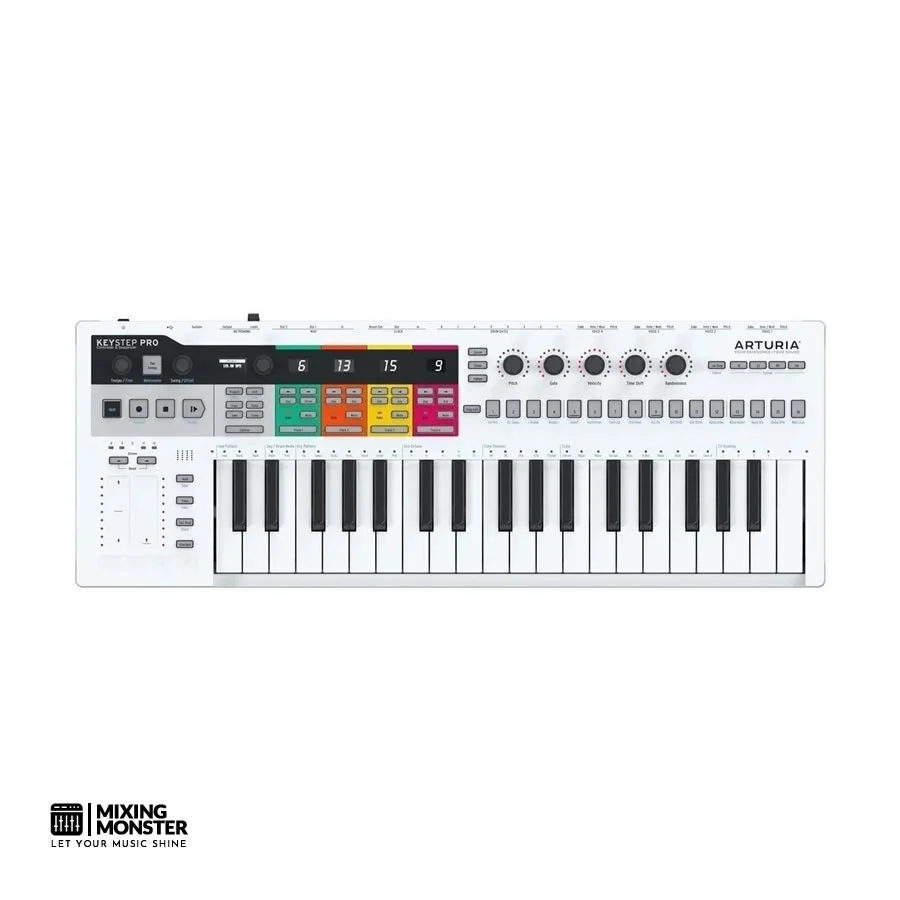
Overview:
The Arturia KeyStep Pro MIDI Keyboard is a versatile and powerful instrument designed for the modern musician. It offers a variety of features, such as a 37-note keybed with velocity and aftertouch, an integrated 4-track sequencer, and extensive connectivity options, including MIDI, USB, and CV/Gate outputs.
This makes the KeyStep Pro an ideal central hub for music production setups, allowing seamless integration with various hardware and software.
Pros:
- 37-note slim keyboard with velocity and aftertouch for expressive playing
- Integrated 4-track sequencer for comprehensive control over your composition
- Multiple connectivity options, including MIDI, USB, CV/Gate, and Sync
- Intuitive user interface with a plethora of controls for real-time adjustments
- Chord and arpeggiator modes with multiple time divisions and swing settings
Cons:
- It may be complex for beginners or those not familiar with sequencers
- The compact size might not suit players used to full-sized keys
- Limited to four tracks, which might be restrictive for complex compositions
- No built-in sounds; external gear or software required for sound generation
- Some users may find the build quality not on par with higher-end keyboards
Unique Selling Point:
A standout feature of the Arturia KeyStep Pro MIDI Keyboard is its integrated 4-track sequencer. This unique selling point allows musicians to compose, arrange, and perform with hardware and software instruments seamlessly, elevating it from a simple MIDI controller to the centerpiece of a music production setup.
Key Benefits:
- The sequencer enables intricate compositions with its polyphonic step-sequencing capabilities, serving users who wish to create complex arrangements.
- Extensive connectivity options ensure that the KeyStep Pro is the central hub of any music production setup, catering to those who use a mix of modern and vintage gear.
- Real-time controls offer immediate access to editing parameters, allowing performers and producers to tweak their sound on the fly.
Pricing:
| Average Price | ~ $500 |
Review:
The Arturia KeyStep Pro MIDI Keyboard is a game-changer for professionals who need a compact yet powerful controller and sequencer. From the moment you lay your hands on the responsive keys, you’ll appreciate the level of control at your fingertips.
The sequencer is the heart of the KeyStep Pro, allowing for intricate pattern creation and real-time recording that can bring your music to life. Its ability to send multiple signals simultaneously makes it incredibly flexible for live performances and studio work.
Navigating the KeyStep Pro’s features is intuitive, thanks to its well-designed layout and clear labeling. Including features like chord and arpeggiator modes and multiple time divisions adds to its versatility, making it suitable for a wide range of musical genres and styles. The tactile knobs and buttons provide satisfying feedback, which is crucial during a live set or an intense studio session.
However, the KeyStep Pro isn’t just about performance; it’s also a powerful tool for songwriting and arrangement. The ability to sequence and control multiple instruments simultaneously makes it an invaluable asset for producers looking to streamline their workflow. And with the ability to store multiple sequences, you can work on different projects without losing your creative flow.
In conclusion, the Arturia KeyStep Pro MIDI Keyboard distinguishes itself as a top-tier MIDI controller and sequencer. Whether performing live, composing new tracks, or producing in the studio, the KeyStep Pro offers control and versatility that can inspire new creative heights. It’s a serious tool for serious musicians, and its capabilities justify its position in the higher tier of MIDI keyboard controllers.
#8 Novation 61SL MKIII
Best Integrative MIDI Keyboard
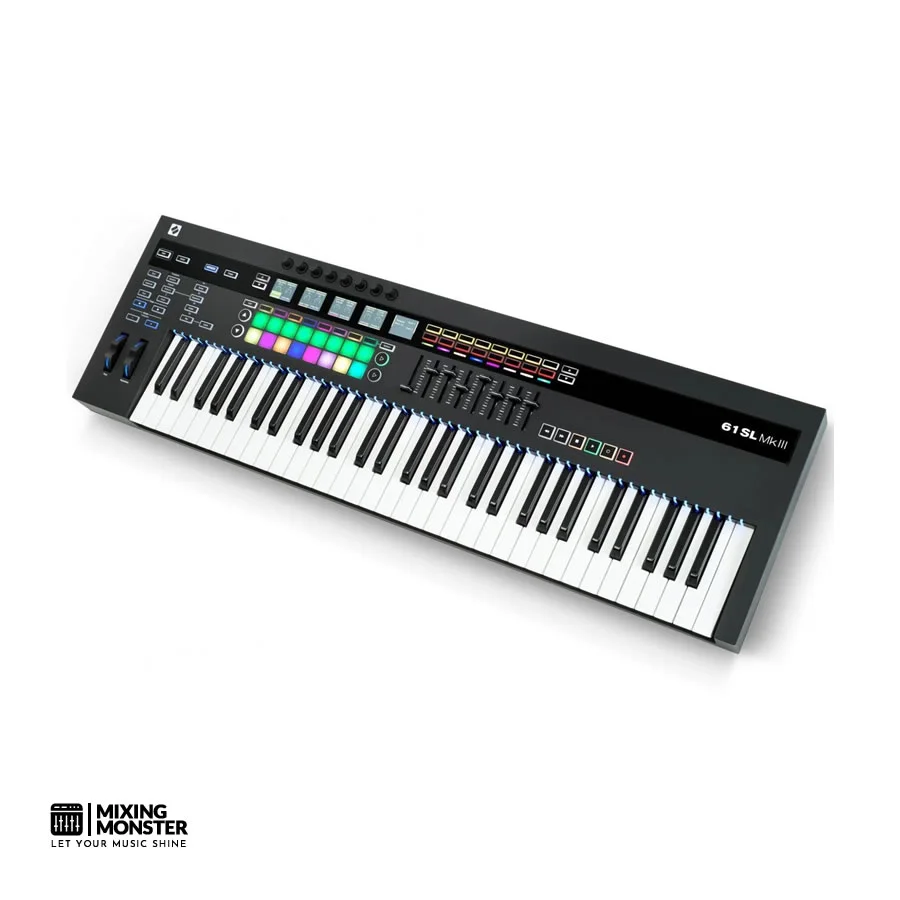
Overview:
The Novation 61SL MKIII MIDI Keyboard is a cutting-edge controller designed to command your music production environment comprehensively. With its intuitive layout and seamless integration with hardware and software, this keyboard becomes the central hub for creating complex compositions.
It features semi-weighted keys that provide a responsive touch, suitable for expressive performances. Including RGB pads, faders, and many assignable controls allows for a highly customizable experience.
Pros:
- Semi-weighted keys offer a natural, responsive feel
- Deep integration with Ableton Live and other major DAWs
- RGB backlit pads for finger drumming and triggering clips
- Extensive customization with assignable knobs and faders
- Onboard sequencer with up to 8-track polyphony
Cons:
- May have a steep learning curve for beginners
- Higher price point compared to entry-level controllers
- Bulky size might not be ideal for small studio spaces
- Requires external power source, not USB-powered
- Some users may not need all the advanced features
Unique Selling Point:
The unique selling point of the Novation 61SL MKIII MIDI Keyboard is its ability to act as the centerpiece of both a hardware and software setup. This keyboard provides excellent tactile control over virtual instruments and allows for hands-on manipulation of modular gear, making it a versatile choice for live performances and studio work.
Key Benefits:
- The semi-weighted keyboard action allows for expressive playing, enhancing musical creativity.
- Integrated 8-track sequencer enables on-the-fly composition without the need for a computer.
- Customizable mappings and deep DAW integration streamline workflow and improve efficiency.
Pricing:
| Average Price | ~ $635 |
Review:
The Novation 61SL MKIII MIDI Keyboard is a premier choice for those serious about their music production setup. When you lay your hands on the semi-weighted keys, you’ll appreciate the quality and responsiveness that allows dynamic playing.
Integrating with DAWs like Ableton Live simplifies the creative process, making bringing your ideas to life easier. The onboard sequencer is a game-changer for live performers, allowing for real-time creation and manipulation of patterns.
Navigating the control surface, you’ll find the RGB pads are perfect for triggering clips or finger drumming, and the faders and knobs offer precise control over your mix and virtual instruments. The ability to assign these controls as needed means that you can tailor the setup to your workflow, making the Novation 61SL MKIII a highly flexible tool in the studio.
However, it’s about more than just the hands-on control. The Novation 61SL MKIII also excels in its connectivity options, with MIDI In, Out, and Out 2/Thru ports, USB, and sustain and expression pedal inputs, ensuring it can connect to virtually any gear in your setup. This integration level sets the Novation 61SL MKIII apart from its competitors.
In conclusion, the Novation 61SL MKIII MIDI Keyboard is a powerhouse for producers and musicians who demand high control over their music. While it may come with a learning curve and a price tag to match its capabilities, the investment is justified by its performance and flexibility.
This MIDI keyboard is not just an instrument; it’s a comprehensive control solution that can elevate your music production to professional heights.
#9 Arturia KeyLab 88 MKII
Best For Professional Studio Use
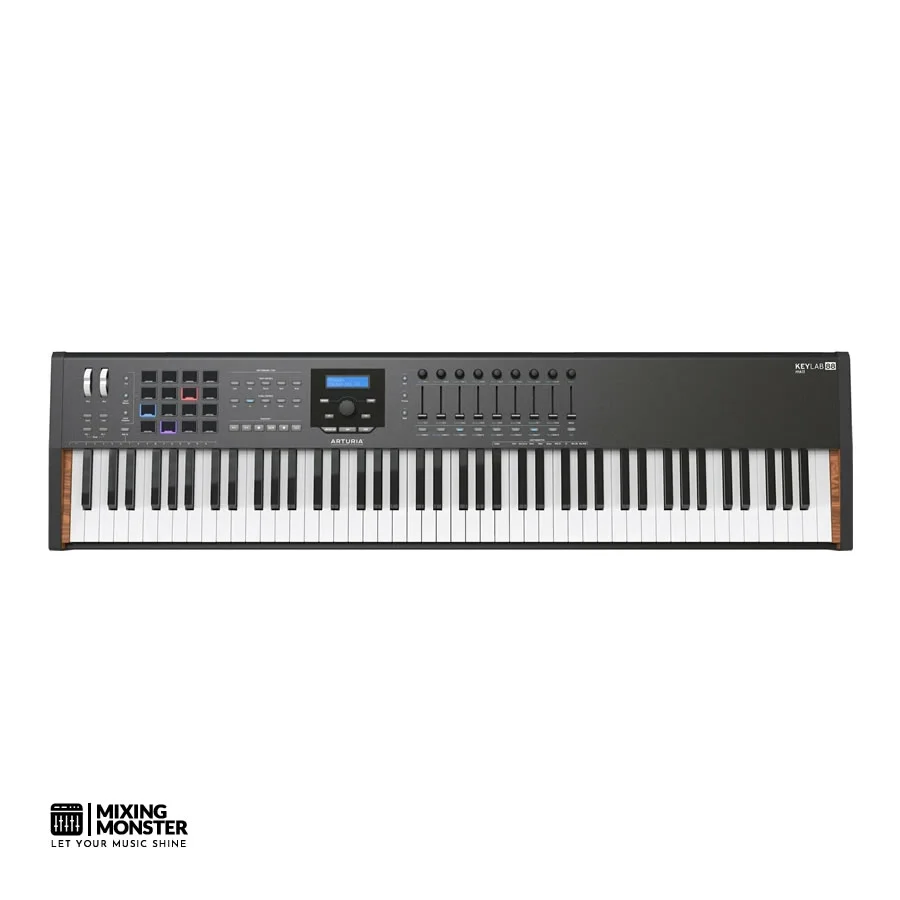
Overview:
The Arturia KeyLab 88 MKII MIDI Keyboard is a premium controller designed for the discerning musician seeking top-notch functionality and build quality.
This keyboard boasts 88 hammer-action keys with a highly realistic piano feel, making it ideal for expressive playing. It is also integrated with Arturia’s software suite, providing users with various sounds and customization options to suit any musical genre.
Pros:
- 88 hammer-action, velocity-sensitive keys for a realistic piano touch
- Durable aluminum chassis with wood side panels for a professional look
- Comprehensive control options with faders, knobs, and pads for versatile studio use
- Seamless integration with Arturia’s software suite for extensive sound libraries
- 4 CV/Gate outputs for controlling modular gear
Cons:
- A higher price point may be prohibitive for some users
- It may be too large and heavy for musicians who require a portable setup
- Some users may find the software suite complex to navigate initially
- Limited to USB connectivity, lacking traditional 5-pin MIDI ports
- The extensive features may be overwhelming for beginners
Unique Selling Point:
The unique selling point of the Arturia KeyLab 88 MKII MIDI Keyboard is its exceptional hammer-action keyboard that emulates the feel of a grand piano, coupled with the deep integration with Arturia’s software, making it a powerhouse for studio production and live performance.
Key Benefits:
- The realistic piano action offers musicians the expressiveness of an acoustic piano with the versatility of a MIDI controller.
- Its robust build quality ensures the KeyLab 88 MKII can withstand the rigors of touring and frequent use.
- Including a comprehensive control section makes it an all-in-one solution for music production, reducing the need for additional gear.
Pricing:
| Average Price | ~ $950 |
Review:
The Arturia KeyLab 88 MKII MIDI Keyboard stands out as a top-tier MIDI controller, especially for those who value the feel of a traditional piano combined with modern digital capabilities.
From the moment you lay hands on the weighted keys, the design’s quality and attention to detail become evident. Integrating with Arturia’s software suite opens up a world of possibilities, from classic synth sounds to contemporary textures, all easily accessible from the keyboard’s intuitive interface.
While the price and size may deter some users, the investment is justifiable for serious musicians and producers looking to elevate their setup.
The KeyLab 88 MKII doesn’t just stop at MIDI control; its CV/Gate outputs are a nod to the modular synth community, bridging the gap between digital and analog realms. Although the learning curve for Arturia’s software can be steep, the payoff in terms of creative potential is immense.
In conclusion, the Arturia KeyLab 88 MKII MIDI Keyboard is a professional-grade instrument that will remain relevant in your studio for years, thanks to its quality, versatility, and comprehensive feature set.

2. What Is A MIDI Keyboard?
A MIDI keyboard is a versatile musical equipment often used by producers, musicians, and hobbyists to create and edit music electronically. When we discuss MIDI keyboards, we’re referring to devices that send MIDI (Musical Instrument Digital Interface) data to computers and other MIDI-capable devices to trigger sounds and control other musical parameters.
Features Of MIDI Keyboards
- Keys:
Ranging from as few as 25 to as many as 88, they may be velocity-sensitive or weighted to replicate the feel of an acoustic piano. - Pads:
These are used for triggering samples or beats. - Knobs, Faders, And Switches:
Useful for adjusting volume, panning, or applying effects within the software. - Modulation Wheels And Pitch Bend:
Provide expression and pitch variation control. - Connections:
Typically include USB for computer connectivity and might also have MIDI Out, Sustain Pedal input, and sometimes even CV/Gate for analog synths.
Uses Of MIDI Keyboards
- Input Device:
This enables us to input notes into a Digital Audio Workstation (DAW). - Live Performance:
Can be played as standalone instruments when connected to sound modules or laptop rigs. - Composition Tool:
Assists us in arranging chords, melodies, and beats.
Formatting to MIDI standards ensures compatibility across all music software and hardware, making MIDI keyboards essential for modern music production. We find them in almost every electronic music creation setting due to their portability, functionality, and the creative freedom they offer.
3. MIDI Keyboard Buying Guide
MIDI Keyboard Key Count And Size
Our first consideration when choosing a MIDI keyboard is the number of keys. Depending on the space available and the type of music we wish to play, key counts typically range from 25 to 88. Full-sized keys are preferable for a more authentic piano feel, while mini keys are compact for portability.
MIDI Keyboard Weighted Action
The key action will influence how the keys respond to our touch. Weighted keys imitate the feel of an acoustic piano, which can be crucial for expressive playing. Semi-weighted or synth-action keys are lighter and may be suitable for non-pianist musicians.
MIDI Keyboard Pads, Knobs, And Controls
Assignable pads, knobs, and faders add to our control over music software. We should seek out those with enough control over our needs but avoid excessive complexity that might hinder our workflow.
MIDI Keyboard Connectivity
Ensuring the keyboard has the right connections for our setup is essential. USB is standard, but we may also need MIDI Out, pedal inputs, or Bluetooth for wireless connectivity.
MIDI Keyboard Integration
The MIDI keyboard should integrate smoothly with our music production software. Look for keyboards compatible with multiple DAWs, offering a seamless experience.
MIDI Keyboard Price
We must balance the cost with the features we need. Setting a budget beforehand helps narrow down our choices without overspending.
| Feature | Options | Considerations |
|---|---|---|
| Key Count | 25, 49, 61, 88 | Space, playability, portability |
| Key Action | Weighted, Semi-weighted, Synth-action | Playstyle preference |
| Controls | Pads, Knobs, Faders | Workflow complexity, functionality |
| Connectivity | USB, MIDI, Pedal, Bluetooth | Compatibility with setup |
| Software Integration | Varies | DAW compatibility |
| Price | Varies | Budget, feature balance |
4. Finding Your Perfect MIDI Keyboard: Key Takeaways
When considering a MIDI keyboard, we must assess several key factors to make an informed choice that matches our needs.
- Size And Portability:
- Consider how many keys you need: standard sizes are 25, 49, 61, or 88.
- Assess if you’ll use it in a fixed location or need something lightweight and portable for travel.
- Key Action And Touch:
- Weighted keys mimic the feel of an acoustic piano.
- Semi-weighted keys offer a middle ground between weighted and non-weighted.
- Synth-action keys are ideal for fast electronic music production.
- Features:
- Determine if you need pad controllers, knobs, faders, or modulation wheels to enhance your control.
- Consider aftertouch for added expression.
- Integration:
- Check compatibility with your Digital Audio Workstation (DAW).
- Look for keyboards that offer pre-mapped controls or easy software integration for a smooth workflow.
- Budget:
- Set a realistic budget that reflects your level of use, from beginner to professional.
By carefully considering these elements, we can select a MIDI keyboard that complements our creative process and workflow, ensuring satisfaction and efficient music production.
Our Top Picks For The Best MIDI Keyboards
Best Budget MIDI Keyboards
- Novation Launchkey Mini MK3
- M-Audio Oxygen 25 MKV
- Akai MPK mini MK3
Best Midrange MIDI Keyboards
- Arturia KeyLab Essential 49 mk3
- Native Instruments Komplete Kontrol A49
- Novation Launchkey 88 MK3
Best High-End MIDI Keyboards
- Arturia KeyStep Pro
- Novation 61SL MKIII
- Arturia KeyLab 88 MKII
5. FAQ
1) What features should beginners look for in a MIDI keyboard?
Beginners should look for a MIDI keyboard with easy-to-use interfaces, velocity-sensitive keys for expressive playing, and a reasonable number of octaves. A sustained pedal input and USB connectivity for simple computer integration are also highly beneficial.
2) How do MIDI keyboards differ for live performance versus studio use?
For live performances, MIDI keyboards often have more robust builds and are designed to be portable. They typically have features like performance pads and quick controls to adjust sounds on the fly. In contrast, studio-based MIDI keyboards may offer more detailed control surfaces, integration with specific DAWs, and additional input/output options for complex setups.
3) What are the advantages of higher-priced MIDI keyboards over budget options?
Higher-priced MIDI keyboards usually offer better build quality, more advanced keybeds with aftertouch for expressive playing, expanded integration with software, and an array of customizable controls. They also might include features like standalone operation, onboard sequencing, and a wider variety of input/output ports.
4) Which MIDI keyboards are recommended for FL Studio users?
FL Studio users often benefit from MIDI keyboards that have plug-and-play compatibility with the software. Keyboards such as the Akai Professional MPK Mini MK3 or Novation Launchkey Mini are popular due to their seamless integration, allowing users to map controls and navigate the FL Studio interface quickly.
5) Can you suggest some MIDI keyboards that are well-suited for Ableton artists?
For Ableton Live users, we suggest looking into the Ableton Push 2 or the Novation Launchkey series, as they provide extensive control over Ableton’s environment with dedicated buttons for clip launching, device control, and an intuitive layout that mirrors the software’s interface for an improved workflow.
6) What are some top MIDI keyboards available for under $100?
Affordable yet functional MIDI keyboards under $100 include the Akai Professional LPK25 and the M-Audio Keystation Mini 32. These compact keyboards offer essential features like velocity-sensitive keys and are great for musicians on a budget or those requiring a portable solution.

